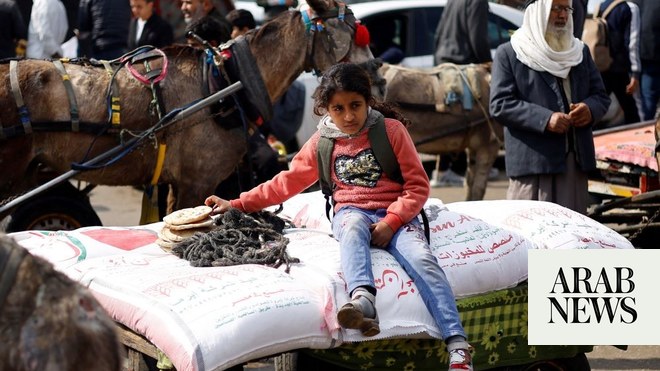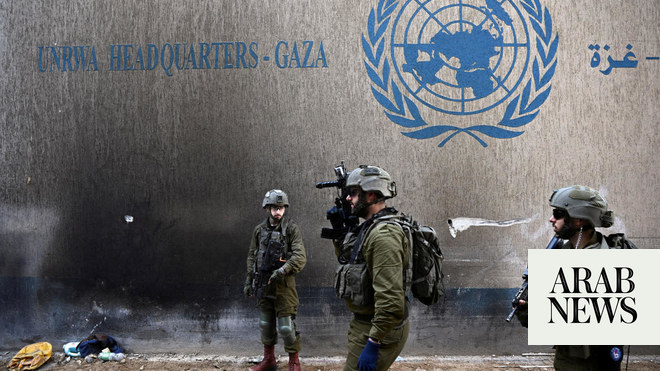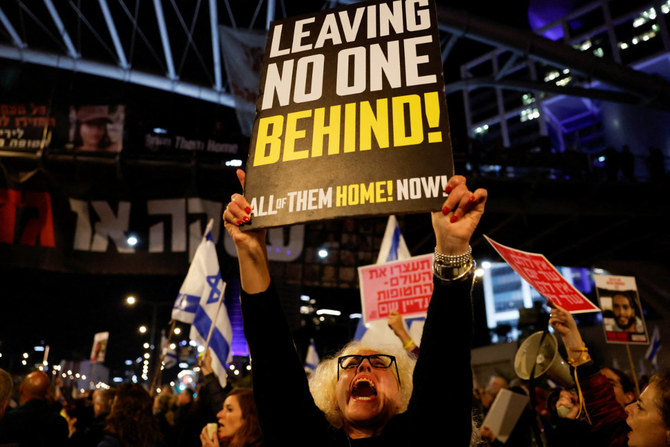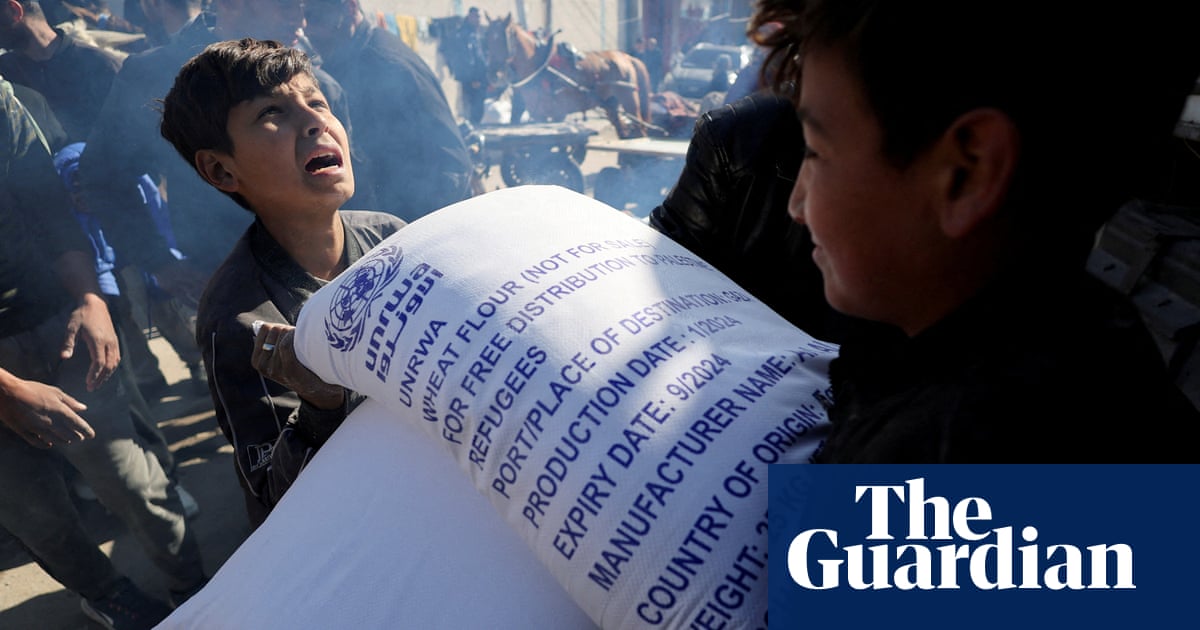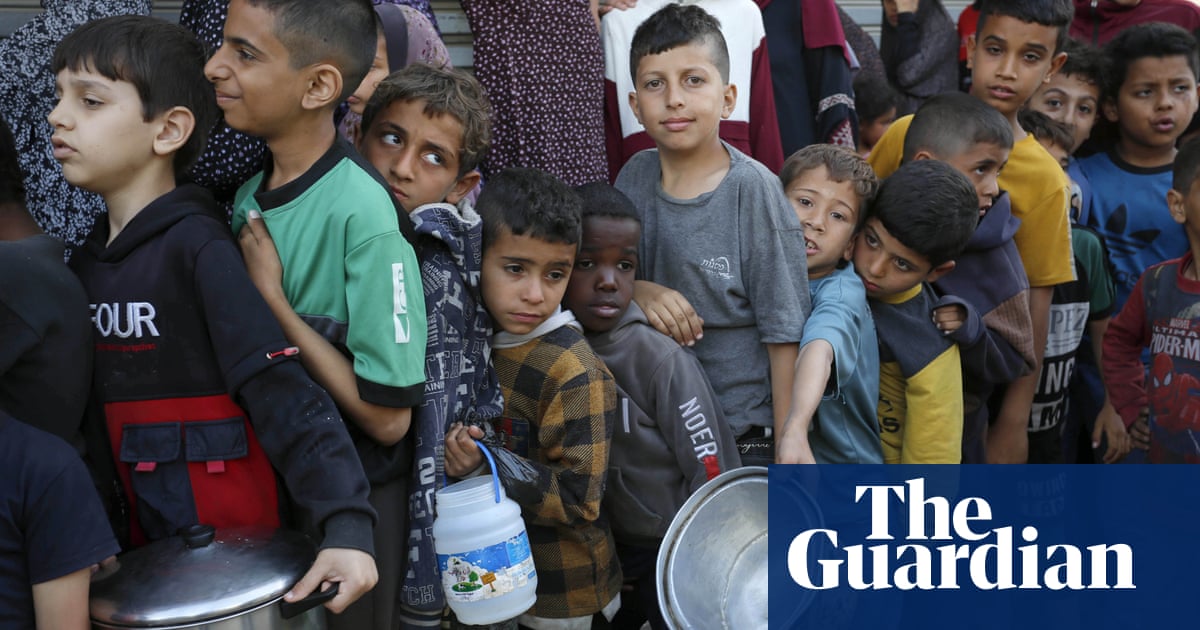
The UN agency for Palestinian refugees must remain “the backbone of any humanitarian response” for the 2 million people in Gaza if mass starvation is to be avoided, the Unrwa director of planning, Sam Rose, says.
Israel is continuing to impede Unrwa convoys to northern Gaza, where 300,000 people are facing famine, he said. “Our space is continuing to be squeezed at a time when the international community urgently needs to get as much assistance as possible to people in the north.”
More than half of the 16 countries that suspended funding to Unrwa – the United Nations Relief and Works Agency for Palestine Refugees in the Near East – after Israel claimed 12 of the 13,000 Unrwa staff in Gaza had taken part in the attack on Israel on 7 October have already decided to resume funding.
However, the US Congress has passed a law banning US funding of Unrwa – normally worth more than $300m (£236m) a year – until at least March 2025. Germany has provided €45m (£39m), but not as yet to Unrwa’s Gaza operations. No decision has yet been made by the UK on funding resumption.
An independent report due to be published on 20 April written by the former French foreign minister Catherine Colonna is not expected to recommend the closure of Unrwa, but to provide clear procedures to ensure the organisation’s neutrality.
There are fears in the aid community that regardless of decisions on the resumption of funding and the opening of new aid crossings, Israel intends to act on its plans to try to squeeze Unrwa out of Gaza permanently. Israel resents that the UN body provides welfare and humanitarian services for Palestinian refugees and their descendants. In Gaza, it claims the agency is entangled with Hamas, which has run Gaza since 2007.
Unrwa says it has to maintain indirect links with de facto authorities in Gaza to distribute aid, just as all UN aid agencies do around the world. Israel has briefed reporters that it aims to phase out Unrwa’s operations across Gaza, the West Bank and Jerusalem.
Rose, who has worked in Gaza, warned: “It is also becoming increasingly difficult for Unrwa to operate in East Jerusalem, because our international staff aren’t getting visas and our own national staff aren’t getting permits to come into the city. Imports have also been restricted and a bank account with an Israeli bank has also been frozen. So whilst the attention is on Gaza, what’s happening in the West Bank cannot be overlooked.”
He said Unrwa welcomed reports of an Israeli cabinet decision to open new crossings, including the port of Ashdod, but that the organisation was waiting to see how and when this would materialise. “Let us see what happens, but in the past what they have publicly said they’re going to do, they have now been doing.” Increased, sustained and predictable access is essential for humanitarian aid and, more importantly, for the commercial sector, to prevent an already catastrophic situation from becoming worse.
After last week’s icy phone call between the US president, Joe Biden, and the Israeli prime minister, Benjamin Netanyahu, 419 trucks entered Gaza on Monday, a record number for a single day since the war began.
Rose said that Unrwa could not simply be switched off by Israel. A new agency would have to hire the same staff and use the same infrastructure and yet not have the same networks or understanding of conditions on the ground. “The simple reality is that no other UN organisations are set up to deliver education to hundreds of thousands of children or healthcare to over 1 million.”
He added: “Unrwa is a 75-year investment by the international community. This shouldn’t be about what we can replace, but what the international community can do to make sure that this war is the last war, to safeguard the lives, freedoms and the future of Palestinians and Israelis by refusing a return to the status quo.”
He said the organisation had funding until May but needed to buy food for 1.1 million people to be distributed in the summer.
The US state department spokesperson Matt Miller appeared to endorse Unrwa’s future role, saying: “We have repeatedly made clear to the Israeli government the important role that Unrwa plays in delivering humanitarian assistance and said that that work should continue unhindered.”
Rose, just back from Gaza, where he said lawlessness and suffering were catastrophic, added: “People are wandering around looking for water, looking for food. Even international staff, who are very privileged in the context of Gaza, come out hungry most times because there’s so little food. We can’t bring much in ourselves and there’s very little in the market at prices anyone can afford.
“And then there’s just a sense that the longer it goes on, the more and more people are just exhausted. Every time you’re woken in the night by an air raid or a tank shell, you’re not starting from zero, you’re in a slightly worse place than you were a time before. People are often coming to work traumatised and in a state of shock.”
He continued: “I don’t want to talk blithely about these things. But one can imagine soon just a total breakdown for lots and lots of people. There’s only so long you can cope with the misery. We’ve got staff who come to work to forget about what is going on outside because there’s a structure and you can forget about the fact that outside, there’s no clothes for your kids, no medicine, no food, and sanitary conditions are appalling.
“So many of their colleagues have had somebody killed and they lost their homes, and they lost everything. They’ve literally got the bags that they were carrying, and, you know, staff that were relatively well off have moved 10 or 15 times because they just followed the conflict around. Many are in tents because they are safer than if you are in a building that has an internet connection, and somebody latches on to that internet connection as a target, then the building could go up.”
There is no real education and prospects for a resumption any time soon are extremely limited, as most of Unrwa’s nearly 300 schools are either being used as shelters by hundreds of thousands of displaced people or have been damaged or destroyed.
“Anyone thinking rationally wants to get out of this, or is unwilling to come back home since they’ve lost everything. Palestinians highly, highly value education and take it very seriously, and lots of people are leaving, people just want to get their kids out. They know the numbers of buildings that have been destroyed, and all the universities have been flattened, and it’s currently hard to see a long-term future.”
Doubtless many Palestinians find it difficult that it took the deaths of western aid workers for Biden to issue warnings to Netanyahu that the Israeli prime minister heeded.
“Palestinians are not idiots,” said Rose. “They are well educated, they’re very worldly given the fact that they’ve never been allowed to leave their world.”




